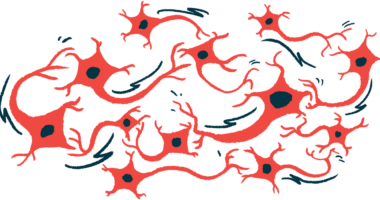Life With ALS Is Hard, and Sometimes the Little Things Are Too Much

Sometimes little things push me over the edge.
One morning last week, I was already cranky because I had burnt the oatmeal. The smell followed me, lingering in my hair as I drove the kids to school. After I dropped them off, I stopped by a store on the way home, hoping to grab chicken and sage breakfast sausages for me and artisan sourdough bread for Todd.
In the parking lot, I put on my mask and walked toward the entrance, where employees were unloading a delivery truck. One of the men told me they were closed and wouldn’t open for several hours. It had been months since I had stopped by that early in the day, and I hadn’t remembered that the hours had changed. I didn’t have time to run to another store on the other side of town.
I got back in my car, and the tears flowed as I made my way up the hill toward home. I breathed in the smell of my burnt-oatmeal hair and sobbed. Crying turned to wailing, and I was aware that I wasn’t crying about my hair or the closed store. Those little things were just conduits to deeper pain.
I cried because my husband, Todd, has ALS. He’s paralyzed. His condition is worsening. His chest muscles continue to weaken, and he can’t clear mucus from his lungs. I cried because life with ALS is hard, and it only gets harder.
When I got home, I dried my tears. Todd called me to get him out of bed. His body ached from a long, restless night.
I washed him up and transferred him into his wheelchair. He followed me to the kitchen, and I made him coffee. Before it had finished brewing, he had fallen asleep with his head down.
While he napped, I left the burnt oatmeal pot to soak and cleaned the kitchen. I made breakfast, and I listened to “Everything Happens, A Podcast With Kate Bowler.”
Bowler, one of my favorite authors, interviewed Anne Lamott, another of my favorite authors. Both of these writers weave words with beauty that feeds my soul, and neither sugarcoats the hardness of life.
Lamott recounted how her best friend had lost her 23-year-old son. As her son was dying, the grieving mother told her Alcoholics Anonymous sponsor that she was terrified. “I’m afraid I can’t do this,” she said.
The sponsor replied, “Well, you’re doing it.”
That statement resonated with me, because often I think I don’t know how to do life with Todd’s ALS. There’s no manual about how to be an ALS spouse and caregiver. I don’t know how to help our kids deal with an uncertain future — or rather a future that is foreseeable, but difficult. I don’t know how to face such a disheartening future myself. But somehow I am doing it.
Somehow Todd and I have been living with this for more than a decade.
I don’t know why I think I should be able to handle this well, as if it’s a reasonable expectation I have of myself. How would I know how to deal with terminal illness and the impending death of my beloved husband? How could I possibly master suffering and conquer grief?
Life with ALS is hard. It’s sad and lonely, and the emotions will inevitably overwhelm me. So, I’m really not overreacting to minor inconveniences — I’m using them as invitations to take time to cry. I feel better when I do.
“There’s a reason God made tears,” my character Grandma Lou said in my novel “Snow Country.” She had lived with her husband’s progressive illness for years, so she knew. I guess I knew it, too, because I wrote the line after I had first heard it from my cousin, whose husband had Huntington’s disease. Last week, I had to learn the lesson again.
We live and we grieve. Sometimes we cry over little things, but we also appreciate the little things.
Todd woke from his nap. I poured his coffee, and between bites of my omelet, I fed him egg and ham on an English muffin.
***
Note: ALS News Today is strictly a news and information website about the disease. It does not provide medical advice, diagnosis, or treatment. This content is not intended to be a substitute for professional medical advice, diagnosis, or treatment. Always seek the advice of your physician or other qualified health provider with any questions you may have regarding a medical condition. Never disregard professional medical advice or delay in seeking it because of something you have read on this website. The opinions expressed in this column are not those of ALS News Today or its parent company, Bionews, and are intended to spark discussion about issues pertaining to ALS.







Richard
Thank you for your posts. They’ve been heartfelt and authentic and while caring for my husband I craved the honesty I found in them. I thought we were on similar paths because Jesse was apparently a slow progressor but then declined rapidly. The strength I was seeking to rally as a caregiver is now being channeled into grieving. You’re right, the little things, the cups of coffee, a shared laugh over modern family, a squeeze of the hand while the sun is setting, deep breaths of mountain air helped us make it through and are now helping me make it through.
Kristin Neva
I hadn't thought of it that way--that the little things that are feeding my soul now will likely be what sustains me in the difficult after. I'm sorry for your loss. Thanks for commenting.
MikeTiredRdyCure
Can we please give more help to people? Care more?
ALS already horrible enough, financial support from the government should be there 100%
We need better treatments please! It's 2021!
How many rich people worldwide. Can we have 1 Billionaire spend his money on this on ALS?
Military, you don't need another aircraft carrier don't need another submarine. Invest more in ALS! Soldiers more likely to get ALS after their service in the military.
I'm angry and disappointed that we can't do better, it's Wrong!!
Kristin Neva
Yes!!!!! I, too, wish there were more resources for ALS and until there's a cure, better support for families.
Jessie Towbin
Thank you, Kristin, for your beautiful writing. Although I am the one with ALS and not the caregiver, you capture my feelings of loss and grief. It's comforting to know that I'm not alone.
Kristin Neva
Thanks for commenting!
Mary Connolly
Such insight and so timely as I’m ‘having a day’ today. Thank you.
Kristin Neva
Thanks for commenting!
AY
Thank you Kristin-I always admire and can relate to your posts. Your YouTube videos have been very helpful also.
I’m a caregiver and my husband was diagnosed in February 2020. He has faster progression and is in a power chair now with very little use of his hands. His voice and swallowing are affected as well.
We have a son who is turning 16 and I so identify with your writing about grief - for what’s been lost and for what will never be.
When I finish reading your posts I feel like I’ve been with someone who understands.
Kristin Neva
Yes, not just our own grief but grief for what our kids have lost and are losing. Thanks for commenting.
Len Jax
Kristen, you have such an eloquent way of expressing your life with ALS and being a caregiver. It is so very touching and honest.
As a person with ALS for going on 6 years now I liken the disease to getting shot every day, there is no bullet hole, no blood, It is neat and tidy but a tiny piece of me is missing each and every morning when I awake.
I have a wonderful life partner, Linda, and she is my caregiver as you are to Todd. You, Linda and all the other caregivers I feel have the most difficult job of all. Hell all I have to do is die and I am learning to do that as I go. You, however as caregivers carry all the responsibility of your loved one, all the feelings of loss for what your life could have been, all the everyday tasks that need to be done and you do it alone! Linda and I used to share everything so I have lost a partner and so has she. I feel grief every day that my disease is putting her through this. She and you, have to watch a little piece of your loved ones vanish before your eyes every day and that takes it's toll.
I have learned that grief can be my friend. Linda and I have shared many a tear together and yes, many tears alone to be strong for each other. I have found that the relief one feels through grief is profound and allows one to move on. I have always worked on acceptance ever since my diagnosis. Denial and anger seemed fruitless to me so I never went down those paths. My Mantra in dealing with the losses of ALS has been to grieve the loss, accept the loss, adapt to the loss as best you can and then move on (GAAMO).
It is not easy and at times I have to grieve the loss of things many times before I reach acceptance but I always try. This process has allowed me to keep moving forward. Even though I have many losses it has often shown me a way to see the hope and joy of life.
Without grief and sadness we would not know the joy that each day brings, savor the joy no matter how small! Thanks for touching my life with your article - it brought peace to my soul - hopefully I have brought peace to yours!
Kristin Neva
Thank you for sharing your beautiful words!
amal
very touching.I have been in a similar situation for 4 years now. it is very hard. it took me about two years to get back to feel semi normal. I fluctuated between denial anger grieve and finally acceptance. When my husband chokes I feel I'm choking as well. Be strong and thank you for sharing your thoughts with us.